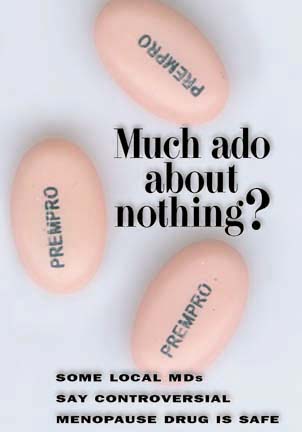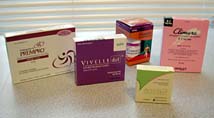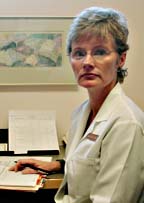|  
IN THE NEWS | CALENDAR

by EMILY GURNON  DR. KIM ERVIN [ see photo below right] was among the many gynecologists on the North Coast and nationwide who were thrown for a loop when the widespread use of hormone therapy was called into question last summer. DR. KIM ERVIN [ see photo below right] was among the many gynecologists on the North Coast and nationwide who were thrown for a loop when the widespread use of hormone therapy was called into question last summer.
The "fateful day" was July 9, and Ervin had not watched the news that morning. She had missed the report that a major national study was halted because it found slightly increased risks of heart disease, breast cancer and strokes for women taking the combined estrogen-progestin therapy. By the time she got to the office, "The phones were already ringing," she said. "People were asking: `What about this study, the Women's Health Initiative?' And I'm like, `What study? I don't know what you're talking about.' It was awful." But after reading about the study and carefully examining its methods, Ervin and other North Coast physicians concluded that the results may not be as dire as they initially sounded. They -- unlike some of their colleagues -- continue to prescribe the therapy to a portion of their menopausal patients. "We found out it wasn't as great a study as we thought," said Dr. Shashi Ajmani, another Eureka gynecologist. "If you look at the data, it's really not statistically significant for the most part." Specifically, the heart disease and breast cancer results "border on statistically significant or are not statistically significant," she said. A less-than-earthshaking study For decades, doctors have prescribed estrogen, or a combination of estrogen and progestin, to patients who are in the "perimenopausal" period, the years leading up to the menopause, as well as those in and beyond menopause. Nationally, about 38 percent of postmenopausal women were using the therapy as of 1995. Estrogen has been credited with relieving the often-brutal symptoms of menopause, which include the well-known hot flashes and night sweats. Other less "public" symptoms include vaginal dryness that can make for painful sex; loss of libido; memory lapses; incontinence; cataract formation; and mood swings. The abrupt halting in July of the government-funded Women's Health Initiative study, which involved 16,000 women nationwide, came as a shock to millions of patients and their doctors. Researchers concluded that not only did the combined estrogen-progestin therapy not provide one of the benefits that the medical establishment assumed it would -- a protection against heart disease -- but the regimen actually increased a woman's chances of developing heart disease, breast cancer, blood clots and strokes. The benefits, slightly less colon cancer and osteoporosis, were outweighed by the risks, researchers decided. But the numbers are small. In comparison with the women who took only a placebo, the study showed an increase of seven women per 10,000 developing heart disease each year with hormone therapy; eight women per 10,000 developing breast cancer; and eight women per 10,000 suffering a stroke. The therapy also showed positive effects: Six fewer women per 10,000 developed colon cancer; five fewer developed osteoporosis. (Taking estrogen alone puts women at risk of developing cancer of the uterus, a risk which disappears when progestin is added. Another arm of the Women's Health Initiative study, examining women with hysterectomies who were taking estrogen only, is continuing.) Ervin is among those who believe that the results of the study were "overblown." There were flaws in the research, she said: Many of the women subjects were older -- age 63, on average -- when they started the hormones than is typical. "We usually start right at the menopause," Ervin said. In addition, there were women in the study who were obese, who smoked, who already had high blood pressure. The heart disease that showed up in some of the subjects may already have been present, though undetected, she said. Ajmani agreed. Other animal studies "all point to [the conclusion that] hormones may still be beneficial as far as preventing heart disease that doesn't already exist," she said. "The Women's Health Initiative did not tell us yes or no on that. It just didn't even address it." Not everyone is as critical. Dr. Kathleen Harner, a Fortuna gynecologist, said the study didn't answer all of the questions doctors have about hormone therapy. But she said it provides some solid information. "Because of the Women's Health Initiative study, I don't prescribe it for what I used to prescribe it for, which was the long-term positive health benefits that I thought women were getting from estrogen," she said. For her patients who have been on the therapy for five years or more, "I generally encourage them to think about either cutting back or going off. Some women just don't want to, and that's fine, as long as they understand there are some risks involved." As many as half of their patients have gone off the drugs since the study's results were made public, local gynecologists say. Nationally, sales figures from Wyeth, the drug company that makes Prempro (the hormone combination given to women in the study), show a drop in the number of women taking the hormones from 2.7 million to 1.5 million. Agonizing about Prempro Anne, a 54-year-old Eureka woman who asked that her last name not be used, was one of those who decided, initially, to stop her therapy. She first read the news about the hormone study when she picked up a copy of a national magazine on a trip to New York this past summer. It scared her. "I started thinking, I don't think I like this," she said. Anne abruptly quit her medication, Prempro. She was past menopause, she reasoned. The bad effects would be gone. They weren't. "I had a really bad time. I stayed off them five, six weeks," she said. "The hot flashes came back, the night sweats came back -- it was terrible." After a long consultation with her doctor, Ervin, Anne decided to go back on the drugs. Many others agonized about their decision. Ervin said her own mother was a prime example. Now in her 70s, her mother has been taking Prempro "forever," Ervin said. When the news about the study came out, her mother called her that night. Ervin's sister Carrie -- who is not a gynecologist -- had called their mother and told her to get off the therapy right away. "I said, `Mom, wait, you trust me, don't you? Then wait.' So I read through the stuff, I did my (Internet) searches, I called her a couple days later and said, `Stay on it.'" A few days later, her mother called Ervin again, saying that sister Carrie still thought she should go off the hormones. "If I'm having this much trouble convincing my mother, I can't imagine what all these other women are going through," Ervin said. "Seriously! Even if they decided to stay on it, their friends are all saying, (gasp!) `You're still taking that stuff?!'" The media's presentation of the results -- a week before they came out in the Journal of the American Medical Association -- created a nightmare for physicians. "The way the data got presented to the public was so blown out of proportion," Ervin said. "You almost felt as if the public had this perception that we were all trying to kill them. And it was pretty sad because for a good number of women, hormone therapy has improved the quality of their lives." A lot of women simply quit their medications cold turkey, doctors said. "Women heard what they did on the news and thought, `Oh my gosh, we're going to be dying left and right from heart disease and that's why they stopped the study earlier,'" Ajmani said. "But it really wasn't that dramatic. I think a lot of people still don't realize that and a lot of primary care physicians don't realize that. They're basically going off what they saw in the media." Different approaches Whatever their views on the quality of the study and the significance of its results, physicians said they have begun to take a different approach to hormone therapy. Ervin said many of her patients decided on their own to stop the therapy. Others were immediately told by their family physicians to discontinue it -- a reaction Ervin called "unfortunate." For those who still have questions, Ervin said she explains what the study really says. Then they discuss the patient's medical history, family history and how she's experienced menopause. "If they're older -- 60s, 70s -- we are encouraging them to try and decrease their dose but not necessarily go off the therapy," she said. One of Ervin's Eureka patients decided to make no changes in her drug regimen. Leslie Selvage, 57, [photo at left] said she went on hormone therapy after initially ruling it out. "I had made up my mind many years ago that when I went through the change I was going to do nothing. I was going to be tough like my mother was," said Selvage, a Eureka grandmother. "But then it seemed foolish. This was something that could help me." She'd been suffering from night sweats and was worried about osteoporosis, after taking a bone density test. The new research gave her pause, she said. But after talking at length with her doctor, she decided the hormones were working for her. "I didn't allow it to really panic me. My thing is tomorrow there's probably going to be another study," with different results, she said. Going off the drugs made Anne, the 54-year-old Eurekan, remember how much she needed them. Her symptoms, she said, were "horrible." "You could be sitting in a meeting talking to people and all of a sudden you just break out, it looks as if you've been jogging for three hours, the sweat just pours off of your face, you turn beet red. It was embarrassing." The night sweats would leave her soaking wet, and the resulting lack of sleep made her irritable, Anne said. "It never skipped a night. And I was seven, eight times a day having hot flashes. It was pretty brutal." With hormone therapy, all that went away, she said. Another Eureka woman, age 57, reported that she feels better sexually on hormone therapy. Without it, she felt like a "shriveled up old prune," she said. A tinge of uncertainty The bottom line, Ervin and other doctors said, is that hormones continue to be very effective for alleviating menopausal symptoms. "That is still the primary indication for hormone replacement: a woman who just feels lousy," Ajmani said. "She's having hot flashes, night sweats, poor sleep, memory's just shot, really moody, depressed mood. Some women just feel better on it. There's a sense of well-being that you can't really describe that a lot of women talk about. All of those things are still reasons to have women on hormones." But the discussion is different today, she said. "It's not, `Oh, it helps everybody, it's good for everything, go ahead and take it.' Now it's like, `OK, here's the data, we still don't know about the heart disease, maybe there's an increased risk, maybe not, because honestly, the Women's Health Initiative does not address that. "We just don't know from that study. Somebody else is gonna have to start over." The Alternative way MANY WOMEN WHO ARE UNCOMFORTABLE taking the combined estrogen-progestin therapy, or who have been advised by their doctors to stop, have tried other methods that may relieve menopausal symptoms. Dr. Peggy Grossman, a family physician in Eureka, said she recommends an estrogen compound that is derived not from pregnant mares -- as are many prescription estrogen products -- but from plants. These manufactured estrogens are "bioidentical" to those in the human body and are assumed to have fewer side effects than animal estrogens, although there have been no large studies to verify that. The compound is available, with a prescription, at local pharmacies such as Lima's or the Henderson Center Pharmacy. Other women try natural remedies for the following: Heart disease. A woman's risk of heart disease increases after menopause. Talk to your provider about assessing your cholesterol and blood pressure. Don't smoke, eat a healthy diet, maintain a healthy weight, get enough exercise and reduce stress. Osteoporosis. After menopause, a woman is also more likely to develop osteoporosis, which can lead to bone fractures. Talk to your provider about determining the strength of your bones. Those not at risk can benefit from adequate calcium and vitamin D, as well as proper exercise. Those at risk should take calcium, vitamin D and a prescription bone drug. Hot flashes. Avoid getting too warm by staying away from hot soups and beverages. Avoid hot-flash triggers like alcohol and spicy foods. Reduce stress. When you feel a hot flash approaching, breathe slowly and deeply. That alone may diminish or eliminate the hot flash. Some research suggests that mild hot flashes can be relieved by eating soy foods or taking a supplement of black cohosh, available at herb and natural food stores. Effects, if any, may take a few weeks. Certain anti-depressants, including Effexor, Prozac and Paxil, have been found to help some women. Vaginal dryness. Lubricants and moisturizers available over the counter can help ease intercourse. Severe cases of vaginal dryness respond only to prescription estrogen, available in the form of vaginal creams, a vaginal tablet, and a vaginal estrogen ring. Estrogen used in this way is not absorbed to a significant extent into the bloodstream, and thus is not associated with any negative side effects. There is no scientific evidence to support claims of the benefits of dong quai, angelica, evening primrose, wild yams or dehydroepiandrosterone (DHEA), other commonly used treatments for menopause symptoms. Doctors recommend that you talk with your gynecologist before quitting hormone therapy. Tapering off gradually, rather than abruptly, will help your body adjust to the change. Sources: North American Menopause Society, www.menopause.org and American College of Obstetricians and Gynecologists, www.acog.org -- by Emily Gurnon
IN THE NEWS | CALENDAR Comments? E-mail the Journal: [email protected] 
© Copyright 2002, North Coast Journal, Inc. |